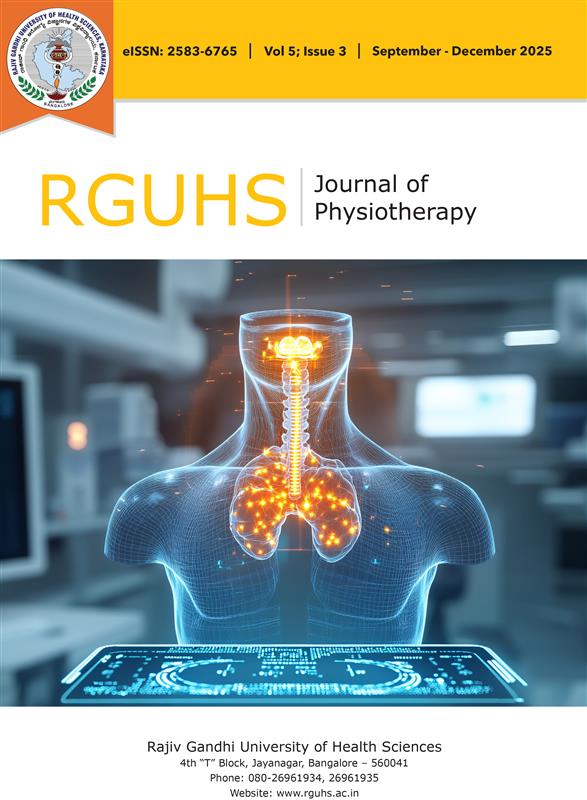
RGUHS Nat. J. Pub. Heal. Sci Vol No: 5 Issue No: 3 eISSN:
Dear Authors,
We invite you to watch this comprehensive video guide on the process of submitting your article online. This video will provide you with step-by-step instructions to ensure a smooth and successful submission.
Thank you for your attention and cooperation.
Prof. Pearlson K
MPT (Aus), Padmashree Diagnostics, Physiotherapy Department, Vijaynagar, Bangalore -560040. E-mail: rjpt2021@gmail.com

Abstract
None
Keywords
Downloads
-
1FullTextPDF
Article
The development of clinical reasoning in Physiotherapy is very crucial, although it is an under researched aspect of physiotherapist learning at the entry level. While researchers have highly addressed the diagnostic reasoning issue in medical trainees, critical disparities in physiotherapy exercises have suggested the need to evaluate the training strategies and clinical reasoning development in learners, particularly in Physiotherapy. Medical reasoning studies are mainly directed towards diagnostic reasoning to establish the active pathology. Within physiotherapist exercises, not only should diagnostic reasoning establish the active pathology, but also establish the cause of the problem and the repercussions of the illness process. This will highly be achieved through clinical reasoning which covers diverse aspects of the illness and the treatment process. Experts in clinical reasoning in physiotherapy emphasize movement analysis central to skilled therapists’ clinical reasoning procedures across different physiotherapist exercise settings. In addition, due to the interactive and ongoing nature of therapeutic practices, physiotherapists collaboratively work with their patients with the aim of determining ways to motivate and engage them in the treatment procedures. The interactive nature of clinical reasoning assists in understanding the patient’s perspective and context on the injury or illness. As an expert in physiotherapy progresses in acquiring knowledge, there is a need to acquire and develop Physiotherapy-distinctive traits in their reasoning process for in-depth understanding of injuries or illnesses.
The process of creation and evaluation of hypotheses is core to clinical reasoning. In the process of diagnosis, healthcare experts create hypotheses that are used during examination in guidance of data collected. Since hypotheses are a representation of the manner in which practice-specific skills and knowledge are organised, a crucial element in clinical reasoning in Physiotherapy (orthopedic) is comprehensive hypotheses generation that addresses elements related to the specific context, the therapist and the patient. Therefore, clinical reasoning plays a major and holistic role in the hypothesis process till treatment is achieved.
Patients’ situations are equivocal by nature. Therefore, clinical reasoning is needed by the practitioners to build reasoning support framework when some facts are unknown. Lack of clear structure in a patient’s situation requires the therapist to decide what to focus on before solving the presented problem. Approaches taken by clinicians to assess, examine and interact with the patient are shaped by the manner in which the clinician frames the patient’s case and are noticeable reasoning techniques. The sort of reasoning tactic applied determines the scope and nature of distinctive health care exercise. The strategy used by the clinician in reasoning alongside the formed hypotheses is a representation of the shape and scope the clinical decision made. Reasoning strategy analyses drawn by the clinician and the formed hypotheses can give an insight into the therapist approach to framing clinical issues.
Not only do professional therapists demonstrate efficient and effective forward reasoning procedures, but also demonstrate a balance of analytical and problem solving with a narrative interpretation which is directed to a particular patient. Expert physiotherapists also display a continuing collaborative reasoning with their patients, while at the same time drawing on different knowledge and skill sources through a flow which is seamless of social interaction coordinated with treatment and assessment. Moreover, professional therapists direct much attention to educating, empowering and engaging the patient than to their techniques and skills. Studies of experts on exercise and clinical reasoning in physiotherapy provides a conceptual structure for practice description, while providing a minimal insight into the manner in which learners acquire and build these capabilities.
Until now, there has been less work addressing the connection between professional learning exercises for instructions and assessment of clinical reasoning and the knowledge about expertise and experts. Expert therapist trainers lack consensus on clinical reasoning and report a big variation in their teaching approaches. In order to effectively and efficiently prepare expert learners for autonomous exercises, professional teaching programs should support learners in developing their skills on clinical reasoning. Clinical reasoning is highly significant in the holistic recovery of the patient and creates a great environment for the parties involved. Its complex problem- framing nature indicates its necessity in healthcare undertakings and the need for patients and clinicians to consider it as an effective and efficient treatment procedure.
Supporting File
References
None